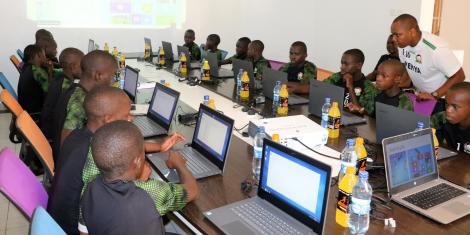
On 13 July 2014, Germany silenced Argentina 1-0 at Rio de Janeiro’s Maracanã Stadium in Brazil in the World Cup final to win the prestigious title.
Their success was not a fluke as it was rooted in a system that was set in place 12 years prior to their fourth World Cup title.
In 2014, many of the top players on the German national team came through Bundesliga academies and were products of the system that was put in place.
Interestingly, five players who were on Germany’s 2009 Under- 21 European Championship winning side started the 2014 World Cup final in Brazil.
These five players also came through German academies included Manuel Neuer, Mesut Özil, , Benedikt Höwedes from Schalke 04’s academy, Jérôme Boateng (Hertha BSC) and Mats Hummels (Bayern Munich).
Now that Kenya is out of contention of the 2022 Workd Cup to be hosted in Qatar, to achieve Kenya’s elusive World Cup dream, “The Road to the 2026 World Cup” has been activated 10 years earlier with Football Kenya Federation (FKF) kick-starting the process with the establishment of youth development programmes and structures.
The strategic plan and roadmap to the 2026 World Cup which will be jointly hosted by USA, Canada and Mexico was crafted by the FKF Nick Mwendwa led administration upon taking over the reigns of power in February 2016 from Sam Nyamweya.
Upon taking over leadership, the new FKF office’s first step was the establishment of U13/15 Leagues in 50 sub-branches across the country, aimed at giving young players a chance to showcase their talents.
Out of the Youth Leagues, the Federation rolled out an U13/15 Youth Championship, whose first edition was held in Nakuru in August 2016.
The tournament, which pitted eight teams from eight regions across the country, gave the federation a platform to select players into the National U13 football team, which took part in the Annual Southampton Cup in England, winning the Shield Trophy in August 2017.
In an effort to sustain this success, the Federation, at the start of 2019, actualized its National Center of Excellence.
The Center brought together young players under the age of 15, most of whom were part of the initial U13 team, on a homeschooling program.
Through a partnership with Wadi Degla, the team holds daily training sessions at the Sports Club’s state of the art facility in Runda while pursuing their studies online at the Center of Excellence based in Thome, Nairobi.
In April 2019, the team took part in the Mediterranean International Cup in Costa Brava, Spain, where they bowed out in the quarterfinals.
The team faced stiff competition from top and established academies across Europe in a tournament gave the upcoming Kenyan youngsters an opportunity for exposure.
Other teams in the tournament were Real Madrid and Barcelona, Manchester United, Manchester City, Paris Saint Germaine, Atletico Madrid and Ajax Amsterdam under-16 sides among other top European sides academies.
Despite playing in an Under 16 tournament, national under 15 coach David Ouma picked up positives from the tournament.
"This was a very positive outing for us. Getting three wins against some of the best academies in Europe is no mean feat. The experience was also good for the development of the players as we move forward in building a team for the future that will go places,” said Ouma.
Later in August, Kenya’s U15 Boys went on to take part in the CECAFA U15 tournament in Eritrea where they reached the finals of the inaugural junior competition, losing out to Uganda in the final.
“These youth programs wouldn’t have been a success without qualified coaches and it’s for this reason that we also rolled out the coaching courses in all the 20 Branches across the country,” said FKF president Nick Mwendwa.
